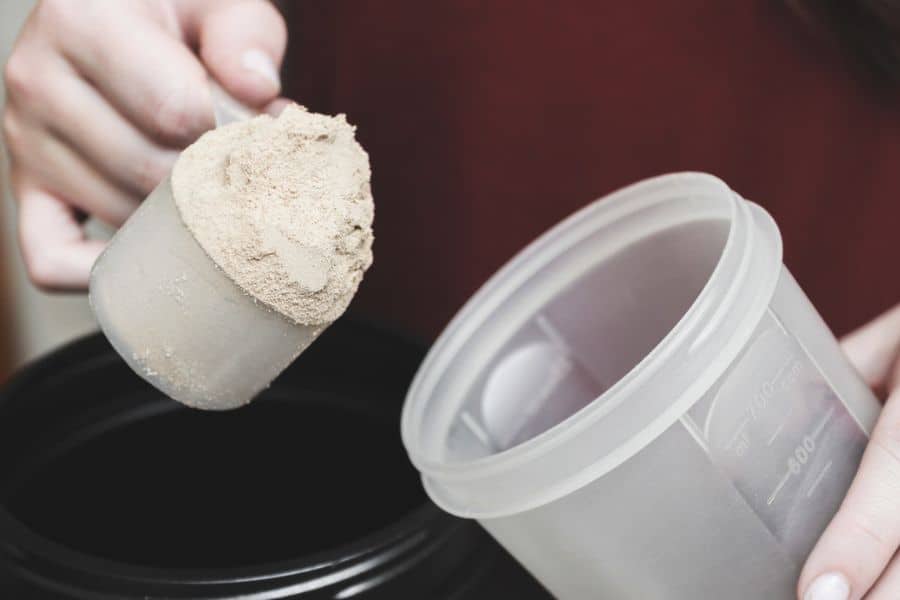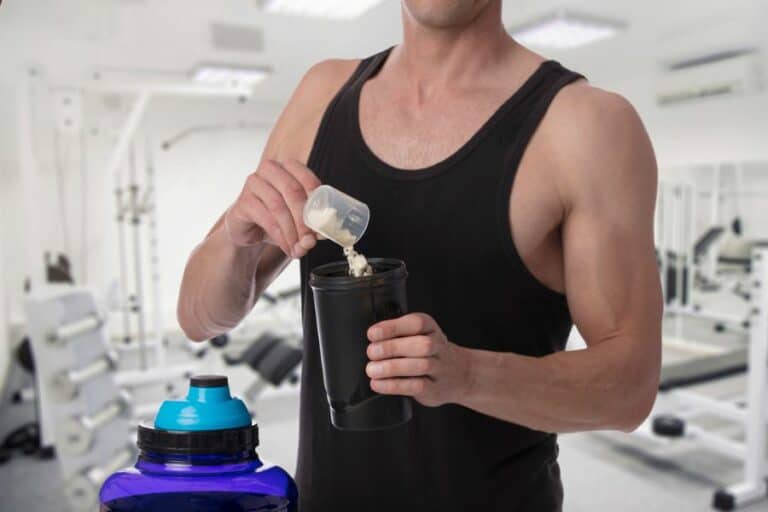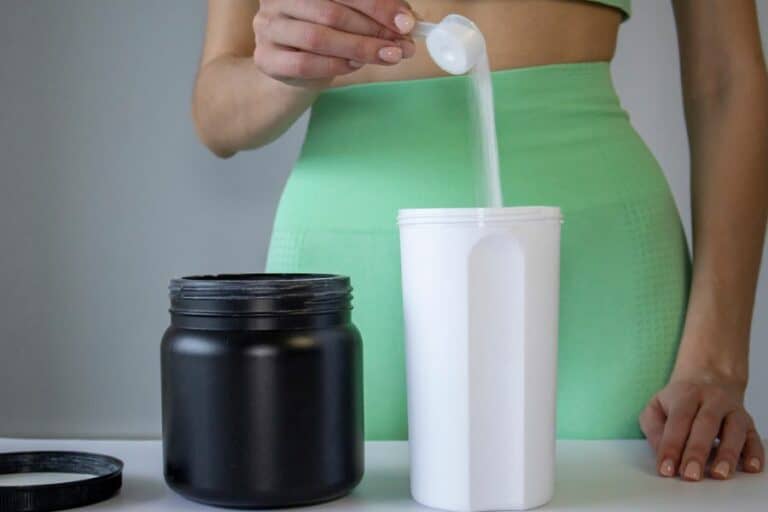How Many Scoops Of Pre Workout Should I Take?

How many scoops of pre-workout? | What are pre-workouts? | Factors to consider | Negative effects of consuming too much pre-workout
Pre-workouts are supplements that provide athletes with the extra energy and focus they need to get through their workouts.
Taking too much pre-workout can lead to unwanted side effects while consuming too little can lead to sub-par performance. So it’s important to know how many scoops of pre-workout you should take.
How many scoops of pre workout should I take?
The optimal pre-workout dosage will depend on your individual needs and the type of exercise or activity you are doing.
If you’re going for a light workout, one scoop of pre-workout may be enough to get you going.
If you’re looking to push yourself harder and increase your energy levels for an intense workout, then two or even three scoops of pre-workout may be needed. This, however, also depends on other factors like body composition and tolerance levels.
Standard scoop of pre-workout
The amount of pre-workout in a scoop may differ depending on the brand and type of product. Usually, a scoop contains 5 to 20 grams of pre-workout powder.
The sizes of pre-workout scoops may differ because of variations in the type and quantity of active and non-active ingredients present in each product.
Some pre-workout supplements are formulated with a high concentration of active ingredients like caffeine, creatine, or beta-alanine. In contrast, others may contain more fillers or lower doses of key ingredients. It may be safer to have larger scoop sizes for the latter.
To avoid any confusion, it is essential to carefully read the manufacturer’s instructions and serving details mentioned on the product before consuming it.
Recommended dose for pre-workout supplements
Manufacturers often recommend taking 1 or 2 scoops of pre-workout supplement per day, which roughly equals 400 milligrams of the supplement.
For beginners, it is advisable to start with a single scoop of pre-workout for the first few days. This allows your body to get used to the ingredients and helps you understand how it affects you.
After this, if required, you can gradually increase the dose. However, it is important to never exceed more than 3 scoops of pre-workout per day as it can lead to adverse effects.
It is best to discuss with your physician or trainer before you begin using pre-workouts to ensure that you are taking the right dosage for your individual needs.
Recommended amount based on caffeine content
Caffeine content is one of the most important deciding factors when it comes to deciding the intake of pre-workouts. The recommended dosage can vary depending on how much caffeine you can consume vs how much caffeine is in the pre-workout supplement.
According to the FDA [1]U.S. Food & Drug Administration: Spilling the Beans: How Much Caffeine is Too Much?, the recommended optimal caffeine intake for adults is no more than 400 mg per day.
In pre-workout supplements’-speak, this is about 1-2 scoops of pre-workout. The amount of caffeine per scoop may vary based on brands and specific product types.
If you are sensitive to caffeine, then it is best to start with a small dose and gradually increase the amount as your body becomes tolerant. On the other hand, if you are used to higher levels of caffeine consumption, then you can take two scoops per day.
Here is a simple split up:
- Dose 1: Under 100mg per scoop is low caffeine. One scoop gives energy and focus. You can scale this up to 2-3 scoops depending on your requirement and tolerance level.
- Dose 2: 100-200mg per scoop is moderate caffeine. Start with one scoop. Use two scoops if needed, but don’t exceed 400mg daily.
- Dose 3: 200-300mg or more per scoop is a high caffeine dose. Be careful with this dose. Exceeding 1 scoop can lead to moderate-chronic caffeine-related side effects.
Understanding pre-workout supplements
A pre-workout is a supplement designed to enhance athletic performance by providing a boost of energy, focus, and endurance before exercise.
Typically, pre-workouts contain a combination of ingredients such as caffeine, creatine, beta-alanine, and amino acids. These active ingredients work synergistically to improve workout intensity, delay fatigue, and speed up muscle recovery.
Caffeine stimulates the central nervous system, increasing alertness and reducing perceived exertion. Beta-alanine helps buffer lactic acid buildup, reducing muscle fatigue, and amino acids aid in muscle protein synthesis. Creatine provides muscles with explosive energy and helps to reduce fatigue during intense workouts.
Different types of pre workouts
There are different types of pre-workout supplements that can be classified based on their main focus or ingredients. Examples include:
- Energy-based pre-workouts: These supplements primarily aim to provide a surge of energy, often through the inclusion of high levels of caffeine or other stimulants and creatine for a quick boost of muscle endurance and power.
- Pump-based pre-workouts: These formulations aim to improve blood flow and increase muscle pumps by using ingredients such as nitric oxide boosters or vasodilators. This helps deliver more nutrients to the muscles, leading to greater fullness.
- Endurance-based pre-workouts: These contain beta-alanine or electrolytes and are intended to enhance stamina and delay fatigue during extended exercise sessions.
- Focus-based pre-workouts: These products aim to boost mental alertness, concentration, and cognitive performance by using nootropic compounds like tyrosine or choline.
Factors to consider when taking pre-workout supplements
It is important to consider the following factors before taking pre-workout supplements:
1. Recommended dosage according to the package
As a rule, make sure to follow the recommended dosage guidelines provided by the manufacturer. If you wish to consume more or less than the number of scoops recommended on the package of your pre-workout, you must consult your physician or trainer first.
2. Size of the standard scoop
Depending on the brand and specific product, the scoop sizes may vary. This may also be subject to the exact quantity of the active ingredients present in the pre workout formulas. This will directly impact how many scoops of pre workout you can safely consume.
3. Body weight and composition
Individuals with higher body weight may require slightly higher doses to achieve the desired effects. Those with lower body weight may need to start with lower doses to assess their tolerance.
4. Fitness goals and activity level
Different pre-workout supplements may be tailored to enhance endurance, strength, energy, or focus. Select a supplement that aligns with your goals and the type of physical activity you engage in. Once you have chosen the pre-workout, you can decide the ideal dose based on your activity level.
Generally, low-intensity workouts require low to moderate doses of pre-workout, while more intense activities may require higher doses.
5. Tolerance and sensitivity
Some people may have different tolerances to the ingredients present in pre-workout supplements, and sensitivity to caffeine may also vary.
If you are sensitive to stimulants or have a low tolerance, consider choosing a pre-workout supplement with lower stimulant content.
For instance, if caffeine causes adverse reactions like sleep issues, anxiety, frequent urination, and so on, you can avoid supplements that contain too much caffeine. You can go for lower doses or fewer scoops of such caffeine-based pre-workouts.
6. Pre-existing health conditions and medications
Certain health conditions or medications may interact with pre-workout supplements or pose risks. These have to be factored in before finalizing the daily intake levels.
If you have cardiovascular issues, high blood pressure, kidney problems, or are taking medications, your health may be affected by the ingredients in pre-workouts.
Ingredients like creatine may interfere with kidney function in people with pre-existing renal health issues. Caffeine may worsen cardiovascular health. Extreme caution is required when consuming supplements with nitrates or precursors to nitric oxide. These promote vasodilation which may prove detrimental for people with high blood pressure.
Avoid consuming pre-workouts if you have such health conditions. Alternatively, you can discuss dosage levels or the number of scoops with your fitness trainer and doctor.
7. Potential for negative side effects and health risks
The amount of pre-workout you can consume may vary depending on the potential negative effects they may have. Each pre-workout comes with its own set of side effects or health risks associated with its overconsumption.
Before starting any new supplement regimen, you need to be completely aware of the possible side effects and health risks.
Negative effects of consuming too much pre-workout
The importance of the correct dosage and optimal intake of pre-workout cannot be overstated. Depending on the primary ingredients in the pre-workout supplement you are consuming, excessive intake can lead to unpleasant side effects.
The expected side effects of over-consumption may include nausea, headaches, jitters, heart palpitations, blood pressure issues, digestive issues, and insomnia. Let’s look at potential risks based on the active ingredients:
1. Too much caffeine
Too much caffeine can cause restlessness, nervousness, and insomnia. It can also lead to an increased heart rate, high blood pressure, and an irregular heartbeat.
Other possible side effects of excessive caffeine intake are dehydration and potential gastrointestinal issues like nausea and diarrhea.
Moreover, long-term overuse of high-caffeine pre-workouts may lead to caffeine dependence or caffeine tolerance(which diminishes its desired effects).
2. Too much beta-alanine
Excessive consumption of pre-workouts with beta-alanine can cause a harmless but temporary side effect known as paresthesia [2]National Library of Medicine: Mechanisms of Itch Evoked by β-Alanine.
Paresthesia [3]National Institute of Neurological Disorders and Stroke: Paresthesia is a condition that causes a tingling or flushing sensation on the skin. It usually happens in the face, neck, or extremities. While paresthesia is generally not dangerous, it can be very uncomfortable for some individuals.
3. Too much creatine
Consuming excessive amounts of creatine in pre-workout supplements can lead to gastrointestinal distress, bloating, and water retention.
Additionally, individuals with underlying kidney conditions or compromised renal function should exercise caution when consuming high doses of creatine as it may potentially increase the risk of acute renal failure in some patients [4]PubMed: Rhabdomyolysis and acute renal failure following arthroscopic knee surgery in a college football player taking creatine supplements.
Creatine produces a byproduct known as creatinine that is normally filtered out of the body by healthy kidneys. Consuming too much creatine can thus lead to excessive production of creatinine, which in turn strains the kidneys.
4. Too much niacin
Niacin, commonly known as vitamin B3, is added to most pre-workouts to aid energy production.
There are two main forms of niacin in dietary supplements: nicotinic acid and nicotinamide. While it is a vital micronutrient when consumed in healthy doses, niacin can be harmful [5]National Institutes of Health: What is niacin and what does it do? when the dosage exceeds the optimum amount.
Taking more than 30mg of nicotinic acid can cause skin redness, burning, tingling, itching, headaches, rashes, and dizziness.
Nicotinamide has fewer side effects but can cause diarrhea, bruising, and increased bleeding at over 500mg per day.
5. Other ingredients
Pre-workout supplements may also have various additional ingredients, such as herbal extracts, filler ingredients, or proprietary blends, which may have specific potential side effects.
It’s important to read the nutrient labels and ingredient lists before buying pre-workouts. Understand the specific ingredients in a pre-workout supplement before consumption.
Certain ingredients may interact with medications, have stimulant effects, or cause allergic reactions in some individuals.
Conclusion
Pre-workout supplementation can certainly provide certain benefits to help support your fitness goals. However, it is essential to understand the ingredients of pre-workouts and their potential side effects or health risks before consuming them. This helps prevent potential side effects from overconsumption of pre workout supplements and allows for optimal benefit from its use.
References
| ↑1 | U.S. Food & Drug Administration: Spilling the Beans: How Much Caffeine is Too Much? |
|---|---|
| ↑2 | National Library of Medicine: Mechanisms of Itch Evoked by β-Alanine |
| ↑3 | National Institute of Neurological Disorders and Stroke: Paresthesia |
| ↑4 | PubMed: Rhabdomyolysis and acute renal failure following arthroscopic knee surgery in a college football player taking creatine supplements |
| ↑5 | National Institutes of Health: What is niacin and what does it do? |







